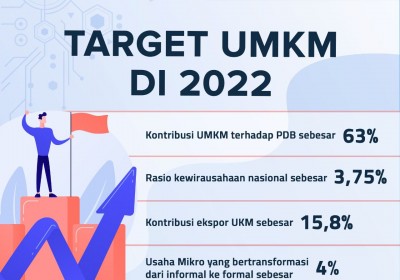Govt Steps Up UMKM Transformation Efforts in the Midst of Pandemic Slowdown
January 04, 2022
JAKARTA – The declining Covid-19 spread rates happening in Indonesia has made the government optimistic that 2022 will be the year that Indonesia will finally emerge from the negative economic impacts of the pandemic.
In line with this perception, the government, through the Ministry of Cooperatives and Small-to-Medium Scale Businesses (KemenkopUKM), has launched medium and long-term stabilization programs for micro, small and medium scale businesses (UMKM) in line with Law (PP) no. 7/2021 concerning the Ease of Business, Protection and Empowerment of Cooperatives and UMKMs.
As outlined, Law no. 7/2021 is a follow-up to 2020’s Law no. 11/2020 on Job Creation. A number of strategies targeted include the allocation of 30% of public infrastructure for use by UMKMs, a rule which states that 40% of all government goods and services must be procured by local UMKMs, further strategic partnerships of UMKMs with State-Owned Enterprises (BUMN) and large businesses, and the establishment of modernized cooperatives.
“Indonesia’s economy will recover if the health sector can be handled properly. One of them is through vaccination, which is currently going as planned, so that the Covid-19 pandemic can be mitigated further,” said KemenkopUKM Minister Teten Masduki on Saturday (6/11).
The KemenkopUKM have outlined a number of targets for 2022, including increasing the contribution of cooperatives into the national gross domestic product (GDP) by 5.3%, increasing the contribution of UMKMs into the GDP to 63%, increase the national entrepreneurial ratio to 3.75%, increasing UMKM exports by 15.8% and transform micro-businesses from informal to formal businesses by 4%.
“We also aim to turn Indonesia into a leading global producer of halal goods. The priority for this aim is to first strengthen and promote our leading Muslim fashion industry. Aside from this, we will continue to encourage the digitalization of more UMKMs. Currently, 16.4 million UMKMs are considered to be ‘digitalized’ and we aim for that number to rise to 30 million by 2024,” Minister Teten said. For two years, he added, Indonesian UMKMs have been struggling and working hard to face the Covid-19 pandemic and it has showed that despite UMKMs being the most vulnerable to the pandemic, they have emerged as the industry which adapted the quickest to the impacts.
The Minister noted that since the beginning of the pandemic, up to 94% of all UMKMs in Indonesia experienced a decline in demand. However, during the emergence of the Delta variant, that number decreased to 37.2%. During the first peak of the Covid-19 pandemic, 53.7% of UMKMs experienced a decline in income of more than 50%. However, during the second wave, their income only decreased by 41.5%.
“This means that the Indonesian economy in 2021 have shown itself to be resilient and consistent in keeping up positive trends, especially during the second and third quarters of that year,” Minister Teten said. Aside from the pandemic, he added, the government must also prepare UMKMs to address their environmental impacts so that they could contribute to the reduction of climate change effects. In other words, UMKMs are encouraged in the future to adopt greener methods to carry out its businesses.
The Minister highlights that by adopting greener methods, it will help increase the quality of UMKM products, open up new markets, increase production activity, result in lower input costs and pave the possibilities for new opportunities.
Indonesia’s Research Institutions Supporting the Development of the Electric Vehicle Industry
Indonesian Muslim Fashion and Cosmetics IKMs Shine at Dubai World Expo 2020
Govt Encourages Promotion of IKM Products in Digital Era
Government Begins Developing Maritime Training Center in Makassar
Government Educates Indonesian Businesses on Entering Middle Eastern Markets
Tweets by IDDevForum
